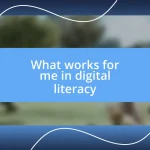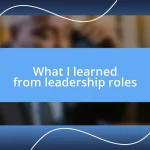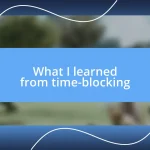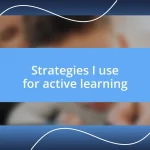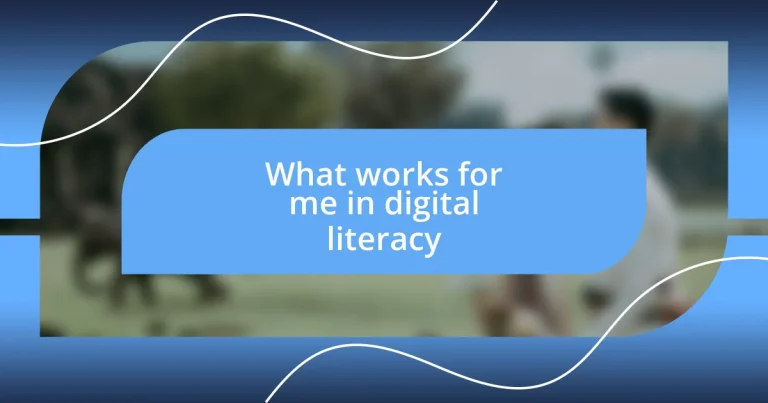Key takeaways:
- Digital literacy encompasses critical thinking, privacy awareness, and effective online communication to navigate the digital world safely and responsibly.
- Essential digital skills include adaptability, critical evaluation of information, and effective collaboration, crucial for succeeding in a tech-driven environment.
- Utilizing tools and resources like cloud storage, project management apps, and online tutorials, alongside community support, enhances digital skills and confidence in navigating technology.
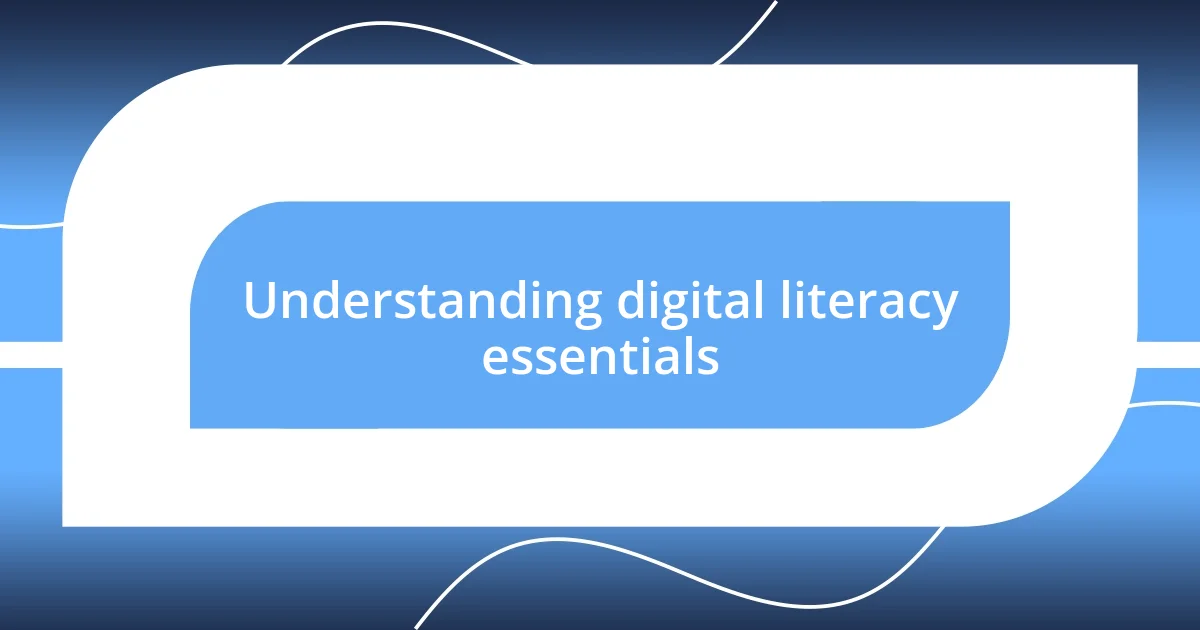
Understanding digital literacy essentials
Digital literacy essential isn’t just about knowing how to use a computer; it’s about understanding how to navigate the online world responsibly. When I first started using the internet, I vividly remember feeling overwhelmed by the sheer volume of information available. I often asked myself, “How do I know what’s true?” This led me to appreciate the importance of critical thinking in assessing the credibility of sources.
One key aspect of digital literacy is understanding privacy and security. I recall a time when I accidentally shared personal information in an online forum, which made me feel vulnerable and exposed. It was a wake-up call that reinforced the necessity of being cautious about what we share online. Engaging with tools like password managers and learning about safe browsing practices became imperative for me. How do you safeguard your information?
Moreover, digital literacy extends to effective communication in an online environment. I remember struggling with tone and context in emails; it’s so easy for messages to be misinterpreted. This experience taught me to be more intentional in my digital communication. Have you ever found yourself questioning whether your message was received as intended? Understanding the nuances of online interaction can truly enhance our connections with others, both personally and professionally.
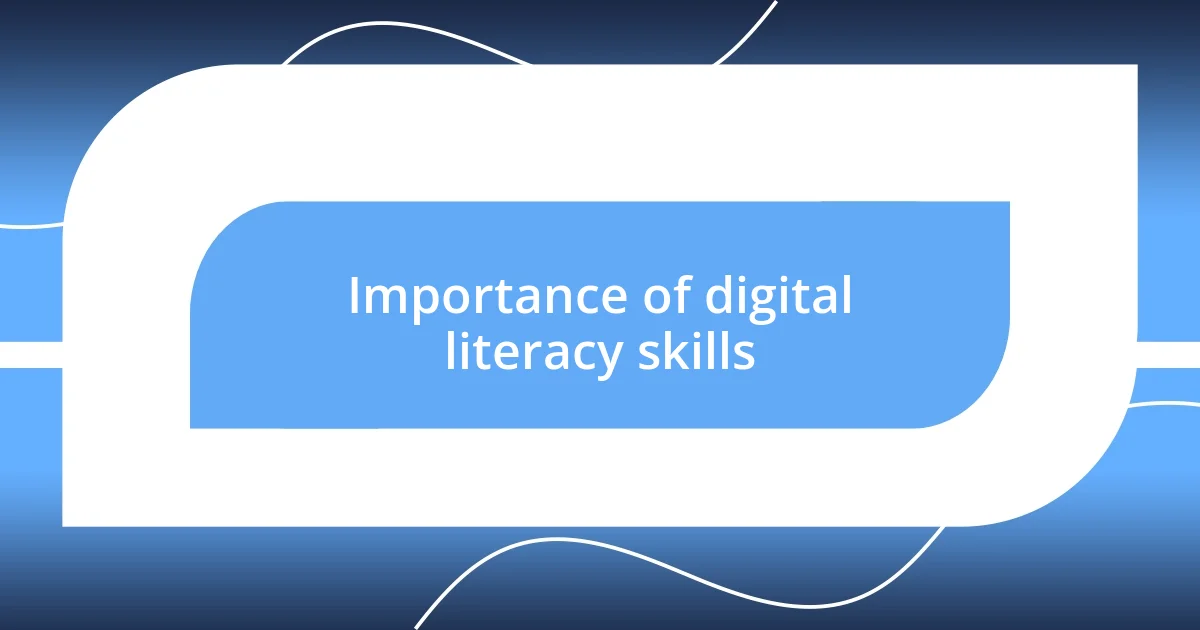
Importance of digital literacy skills
Digital literacy skills play a pivotal role in today’s fast-paced, tech-driven world. I remember when I transitioned from a traditional workplace to a fully digital environment. Initially, I felt lost in the myriad of tools and platforms. This experience highlighted to me how essential it is to not only learn these skills but to continuously adapt as technology evolves. Without solid digital literacy skills, we risk falling behind and missing out on opportunities.
In my own journey, mastering digital literacy also meant being able to evaluate information critically. I once struggled to discern the difference between news and misinformation during a heated social issue. It was frustrating to see friends share unchecked information that could potentially lead to misunderstandings. This taught me that having digital literacy skills is not just about using technology; it’s also about navigating and interpreting the vast landscape of information responsibly. How do you approach information you find online?
Finally, collaboration in a digital space can be both empowering and daunting. I vividly remember a challenging group project conducted entirely online. Coordinating with others via digital tools took patience and a clear understanding of the platforms we were using. This experience underscored how vital it is to be digitally literate—for our teamwork to function effectively and for us to share ideas seamlessly. How comfortable are you working with others in a digital setting?
| Digital Literacy Skills | Importance |
|---|---|
| Adaptability | Helps you stay relevant in a tech-driven world. |
| Critical Evaluation | Enables responsible navigation of information and reduces misinformation. |
| Effective Collaboration | Enhances teamwork and communication in digital spaces. |
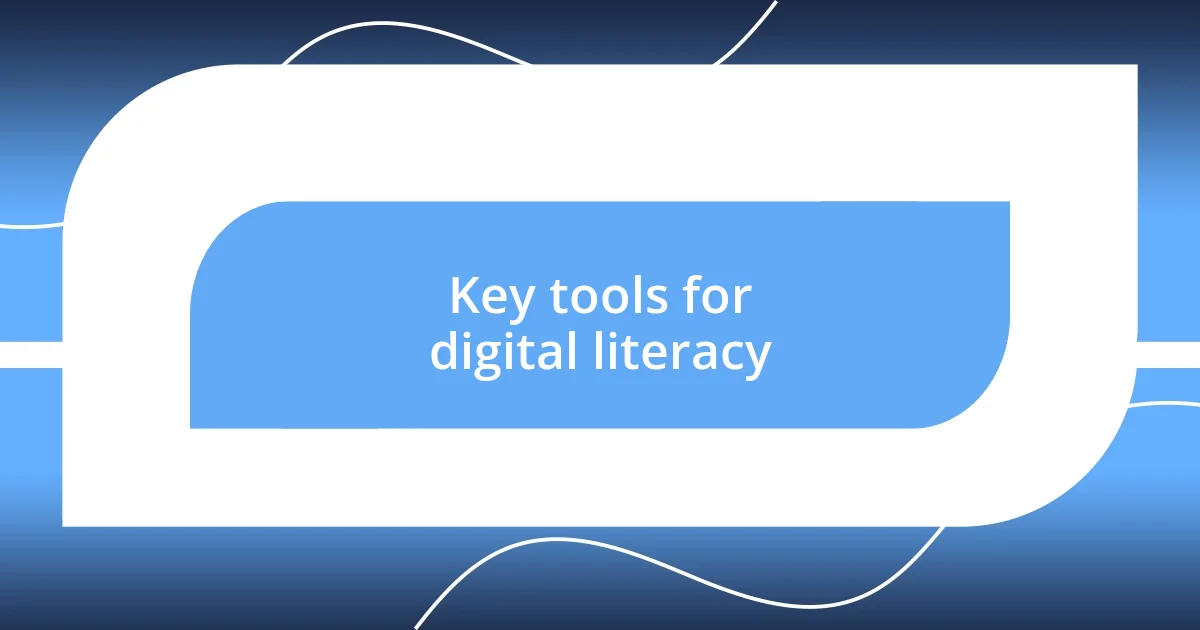
Key tools for digital literacy
Embracing digital literacy requires the right tools to navigate the vast landscape of technology. In my experience, the tools I rely on have significantly shaped my efficiency and understanding, making activities like online research or project management more manageable. I remember feeling overwhelmed during my first online course; it was a struggle to keep track of resources. Investing time in familiarizing myself with platforms like Google Drive and Trello changed the way I organized my work. Their user-friendly interfaces now feel intuitive, and I often wonder how I managed without them.
Essential tools for enhancing digital literacy include:
- Search engines (e.g., Google, Bing): Critical for finding credible information quickly.
- Cloud storage (e.g., Google Drive, Dropbox): Facilitates organization and sharing of documents seamlessly.
- Project management tools (e.g., Trello, Asana): Help keep tasks and deadlines on track for both individual and group projects.
- Password managers (e.g., LastPass, 1Password): Ensure strong security practices by helping manage passwords securely.
- Learning platforms (e.g., LinkedIn Learning, Coursera): Offer courses on digital skills, boosting your knowledge and adaptability.
By utilizing these tools, I’ve transformed not just how I work, but also how I engage with information and collaborate. Each has its own learning curve, but the benefits are well worth the effort in becoming a more competent digital citizen.
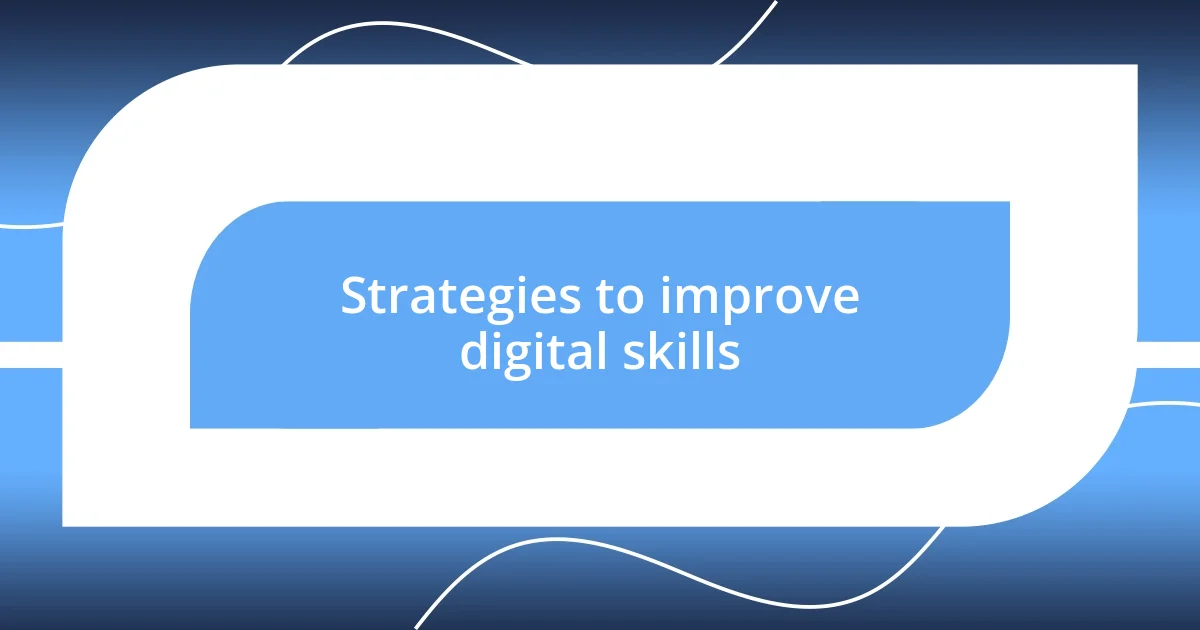
Strategies to improve digital skills
Improving digital skills is a journey rather than a destination. I distinctly recall spending hours on YouTube, learning how to create engaging presentations using tools like Canva. It was surprisingly enjoyable to experiment with different templates and designs. Have you ever found joy in learning a new digital tool? For me, that experience brought a sense of accomplishment, and it motivated me to explore further.
Regular practice is another strategy that has proven invaluable. When I committed to trying out a new app or feature daily, my confidence grew exponentially. I remember struggling at first with digital note-taking apps, feeling overwhelmed by all their functions. However, setting aside just fifteen minutes each day to play around with them resulted in a more fluid workflow. How often do you dedicate time to just experiment with new technology?
Lastly, seeking community support can transform your learning experience. I joined local workshops where we dived into various digital tools together. It was refreshing to share frustrations and victories with others who were on similar paths. The sense of camaraderie made the learning curve feel less steep. Have you considered joining a group or finding an online community to push your digital literacy skills? It’s incredible how much easier we can navigate this digital world when we support each other.
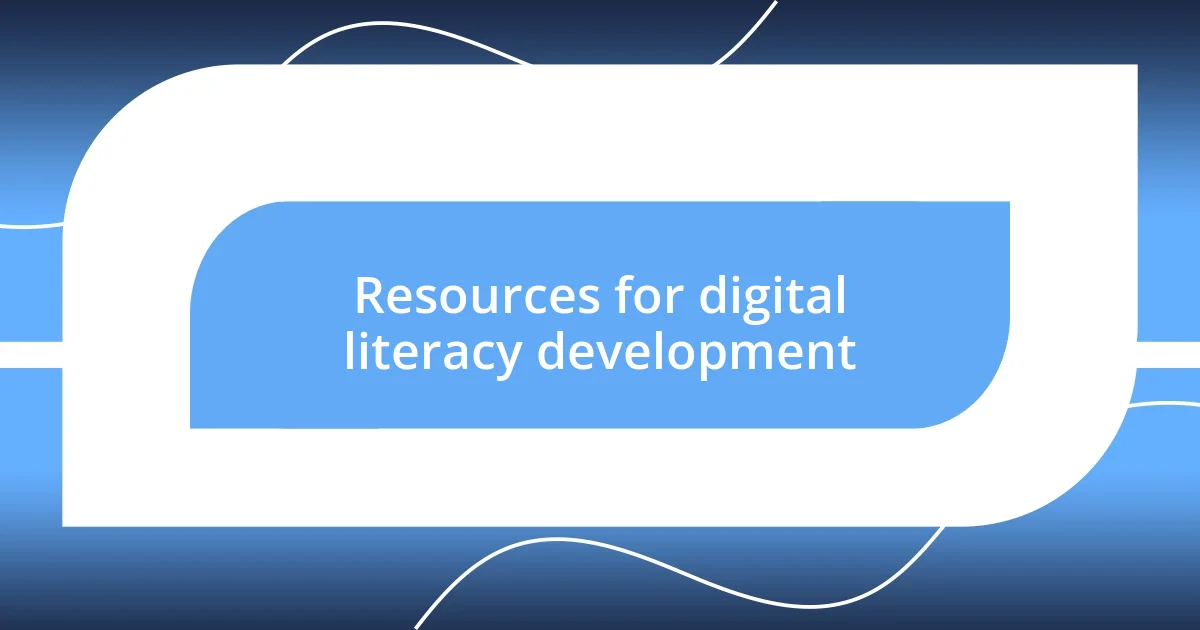
Resources for digital literacy development
When it comes to enhancing digital literacy, I’ve always found that online tutorials can be game-changers. I remember one late night, struggling to understand the ins and outs of Excel for a project at work. I turned to an online tutorial platform, and within an hour, I was confidently creating spreadsheets that initially seemed daunting. Have you ever had that lightbulb moment while watching a tutorial? It’s amazing how a well-structured video can demystify complex concepts and boost your confidence.
Books and eBooks also play a crucial role in my learning journey. I once picked up a guide on digital marketing that changed my perspective on online strategies. Not only did I gain valuable insights, but it also ignited my passion for exploring other topics within digital literacy. Have you considered how a single book can alter your understanding of the digital landscape? I often refer back to that resource, and it consistently inspires me to delve deeper into new areas.
Lastly, I can’t emphasize enough the value of engaging with educational blogs and podcasts. Just last week, I listened to a podcast episode about cybersecurity that opened my eyes to protecting my online presence. You never know where your next big idea will come from! Have you stumbled upon a blog that inspired you to take action? For me, these informal yet informative resources create a dialogue that is both insightful and motivating, providing real-world applications for the theories we encounter.
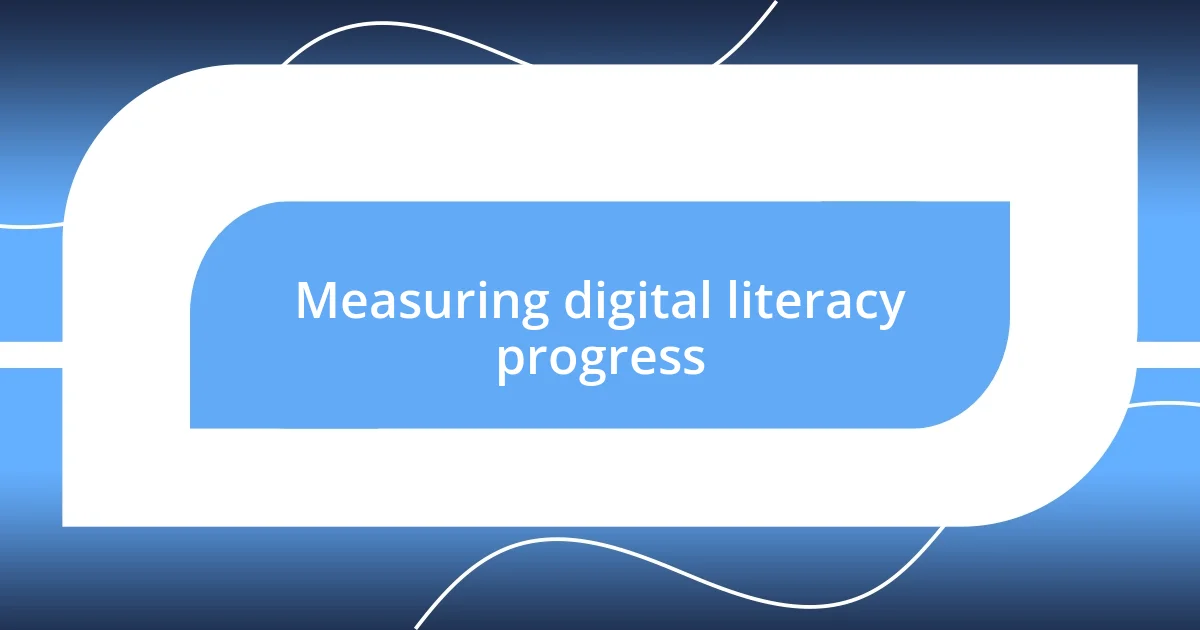
Measuring digital literacy progress
Measuring progress in digital literacy can sometimes feel like navigating through a maze. I’ll never forget the day I decided to track my progress with a simple spreadsheet. By listing out my skills and using a traffic light system—red for needing improvement, yellow for in progress, and green for mastered—I visually captured my journey. Can you imagine how motivating it felt to start seeing more green than red? That visual representation brought clarity and spurred me on.
Self-assessment is another effective tool I’ve utilized. I used to underestimate my abilities until I came across online quizzes that gauged my digital skills. After completing one, I was surprised to see I was more proficient than I had thought! Has a self-evaluation ever revealed your hidden strengths? The realization pushed me to tackle new challenges with renewed confidence.
In addition, gathering feedback from peers can enhance your understanding of where you stand. Some time back, I initiated a feedback roundtable with friends where we assessed each other’s digital skills through practical exercises. Their insights were enlightening, highlighting aspects I never would have considered. Have you ever sought feedback and discovered valuable perspectives? Engaging with others not only refines your skills but also promotes a supportive environment for growth.


